Mahk jchi tahm buooi yahmpi gidi
Mahk jchi taum buooi kan spewa ebi
Mahmpi wah hoka yee monk
Tahond tani kiyee tiyee
Gee we-me eetiyee
Nanka yaht yamoonieah wajitse
Mahk jchi taum buooi kan spewa ebi
Mahmpi wah hoka yee monk
Tahond tani kiyee tiyee
Gee we-me eetiyee
Nanka yaht yamoonieah wajitse
envoyé par giorgio - 19/9/2012 - 08:28
Langue: anglais
English version
HEARTBEAT DRUM SONG
A hundred years have passed
Yet I hear the distant beat of my father's drums.
I hear his drums throughout the land.
His beat I feel within my heart.
The drum shall beat
so my heart shall beat.
And I shall live a hundred thousand years.
A hundred years have passed
Yet I hear the distant beat of my father's drums.
I hear his drums throughout the land.
His beat I feel within my heart.
The drum shall beat
so my heart shall beat.
And I shall live a hundred thousand years.
envoyé par giorgio - 19/9/2012 - 08:35
Langue: finnois
SYDÄNRUMPU - MAHK JCHI
Mä kuulen rummut nuo isien
kun ne soi takaa vuosisatojen
ne laulaa laulua sydämen
intiaanikansojen menneiden
laulun kuulee Äiti Maa
Isä Tuuli sylissään kuljettaa
lauluaan ikuista
sydänrumpu soittaa mun rinnassa...
Mä kuulen rummut nuo isien
kun ne soi takaa vuosisatojen
ne laulaa laulua sydämen
intiaanikansojen menneiden
laulun kuulee Äiti Maa
Isä Tuuli sylissään kuljettaa
lauluaan ikuista
sydänrumpu soittaa mun rinnassa...
envoyé par Bernart Bartleby - 23/1/2014 - 09:24
This is actually a poem written by Shirley Daniels(Ojibwe) in 1969. It is called 'A Hundred Years', but is also known as, 'My Father's Drums'. This is not the actual translation of the song. I do have this album and this poem appeared on the liner notes of the "Red Road Ensemble" album. But because it was printed close to the Tutelo-Saponi lyrics for Mahk Jchi, many mistook it for a translation.
The actual translation is:
Our hearts are full and our minds are good. Our ancestors come and give us strength. Stand tall, sing, dance and never forget who you are or where you come from.
The actual translation is:
Our hearts are full and our minds are good. Our ancestors come and give us strength. Stand tall, sing, dance and never forget who you are or where you come from.
Shawna S. - 13/1/2013 - 23:51
Hi, I actually have a question. Is this translation the entire song or only the verses from the chorus. I love this song and would really appreciate knowing the full version in English. Thanks so much. Luv, Light, and Blessings. CristinaMaria
Letti i commenti di Shawna S e di Cristina Maria mi sorge più di un dubbio...
Se autrice della poesia è Shirley Daniels, ricercatrice folklorica canadese di Ottawa con ascendenze Chippewa e di lingua Ojibwe, allora perchè avrebbe scritto questi versi in una lingua della famiglia Siouan, cui non mi pare proprio afferisca l'Ojibwe?
Non sarà che Shirley Daniels abbia semplicemente raccolto un canto tradizionale?
O non sarà invece che la lingua non è il Tutelo/Saponi di ceppo Siouan ma il Chippewa?
Rilevo infatti in Rete che nel 1968 Shirley Daniels pubblicò ad Ottawa un volume intitolato "Ojibway Songs, Narratives, and Other Traditions from the Lake of the Woods" e l'anno seguente avrebbe lei stessa composto questa poesia...
Forse merita (se merita...) approfondire la questione.
Se autrice della poesia è Shirley Daniels, ricercatrice folklorica canadese di Ottawa con ascendenze Chippewa e di lingua Ojibwe, allora perchè avrebbe scritto questi versi in una lingua della famiglia Siouan, cui non mi pare proprio afferisca l'Ojibwe?
Non sarà che Shirley Daniels abbia semplicemente raccolto un canto tradizionale?
O non sarà invece che la lingua non è il Tutelo/Saponi di ceppo Siouan ma il Chippewa?
Rilevo infatti in Rete che nel 1968 Shirley Daniels pubblicò ad Ottawa un volume intitolato "Ojibway Songs, Narratives, and Other Traditions from the Lake of the Woods" e l'anno seguente avrebbe lei stessa composto questa poesia...
Forse merita (se merita...) approfondire la questione.
Bernart Bartleby - 23/1/2014 - 09:01
Resta poi il fatto che nei crediti del disco - come correttamente riportato da Giorgio - la paternità del brano è attribuita al gruppo Ulali (Pura Fe, Soni, Jen)... Tuttavia c'è anche scritto che il testo non era originariamente in Tutelo/Saponi perchè fu tradotto in tale lingua da Lawrence Dunmore...
Bernart Bartleby - 23/1/2014 - 09:08
Sorry for the late reply.
"Our hearts are full and our minds are good. Our ancestors come and give us strength. Stand tall, sing, dance and never forget who you are or where you come from." - These are the full lyrics.
Bernart Bartleby - I'm sorry but I don't speak Italian. I can't tell if you were saying something to me or not. Apologies.
"Our hearts are full and our minds are good. Our ancestors come and give us strength. Stand tall, sing, dance and never forget who you are or where you come from." - These are the full lyrics.
Bernart Bartleby - I'm sorry but I don't speak Italian. I can't tell if you were saying something to me or not. Apologies.
Shawna Shananaquet - 15/7/2015 - 04:26
What a load of crap. Shirley Daniels is my mother. Her work, Drums of my Father, is copyrighted (I have the original copyright certificate), and was stolen from her by Robbie Robertson. He never asked her for permission to use, publish, or alter her work. I know the history and the raison d'etre of this song, but it's not for sharing, so speculate all you want about its meaning.
Chantal Batt - 2/10/2018 - 23:22
Che simpatico l'intervento di Chantal Batt, me l'ero perso...
"I know the history and the raison d'etre of this song, but it's not for sharing, so speculate all you want about its meaning"...
Ehi, Miss Nervy, prenditela con Robbie Robertson, se è vero che ha fregato la canzone a tua madre!
Ehi, Miss Sympathy, noi qui cosa c'entriamo?!?
"I know the history and the raison d'etre of this song, but it's not for sharing, so speculate all you want about its meaning"...
Ehi, Miss Nervy, prenditela con Robbie Robertson, se è vero che ha fregato la canzone a tua madre!
Ehi, Miss Sympathy, noi qui cosa c'entriamo?!?
B.B. - 23/5/2019 - 22:22
×
![]()

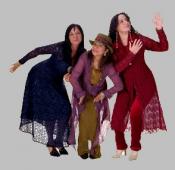


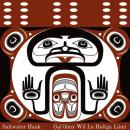

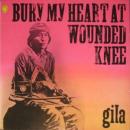
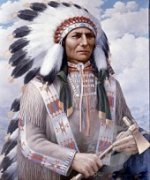
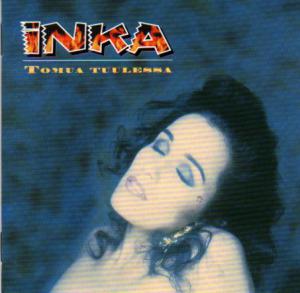
Performed by Ulali: Pura Fe, Soni and Jen.
Album: Music For The Native Americans (Robbie Robertson's album)
Tutelo/Saponi were Siouan languages spoken in the Ohio Valley. Tutelo was a language of Virginia. The last fluent speaker died in the 1990's, and few Tutelos remember anything of the old language today.
However some Tutelo people are trying to revive their ancestral language for cultural purposes.
The Saponi language has been extinct much longer, but it is thought to have been a dialect of Tutelo, both from the similarity in vocabulary and from historical accounts indicating that people from the two tribes could understand each other without an interpreter. The main difference is that the Saponi dialect appears to have borrowed a number of vocabulary words from southern Algonquian languages like Powhatan and a few from African languages (the Saponi Indians were known for sheltering African slaves).